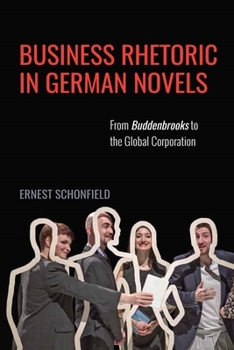Business Rhetoric in German Novels: From Buddenbrooks to the Global Corporation
(Book #191 in the Studies in German Literature Linguistics and Culture Series)
Argues on the evidence of nine major German novels that literature and business have in common a reliance on language, understood in a creative, performative, and rhetorical sense.
Throughout the twentieth century and well into the twenty-first, Germany has maintained its position as one of the world's largest economies. In the literature of this period, business is often depicted as a performance that requires great linguistic skill. This book is a study of the representation of business practices in nine German-language novels - published during the period from 1901 to 2013 - that explore how language is used rhetorically in pursuit of economic and political agendas. Taken up as case studies, in chronological order, the novels are by Thomas Mann, Heinrich Mann, Gabriele Tergit, Bertolt Brecht, Ingeborg Bachmann, Hermann Kant, Friedrich Christian Delius, Kathrin R ggla, and Philipp Sch nthaler, all of whom articulate cultural imaginaries and political ideologies at key moments in recent German history. In doing so, they challenge readers to refine their own interpretive skills. By considering business rhetoric in the novels, Ernest Schonfield shows how the formulation of language remains inseparable from the exercise of economic and political power. The central message of this book is that literature and business have something essential in common: they both rely on the persuasive use of language. Ernest Schonfield is Lecturer in German at the University of Glasgow.
Throughout the twentieth century and well into the twenty-first, Germany has maintained its position as one of the world's largest economies. In the literature of this period, business is often depicted as a performance that requires great linguistic skill. This book is a study of the representation of business practices in nine German-language novels - published during the period from 1901 to 2013 - that explore how language is used rhetorically in pursuit of economic and political agendas. Taken up as case studies, in chronological order, the novels are by Thomas Mann, Heinrich Mann, Gabriele Tergit, Bertolt Brecht, Ingeborg Bachmann, Hermann Kant, Friedrich Christian Delius, Kathrin R ggla, and Philipp Sch nthaler, all of whom articulate cultural imaginaries and political ideologies at key moments in recent German history. In doing so, they challenge readers to refine their own interpretive skills. By considering business rhetoric in the novels, Ernest Schonfield shows how the formulation of language remains inseparable from the exercise of economic and political power. The central message of this book is that literature and business have something essential in common: they both rely on the persuasive use of language. Ernest Schonfield is Lecturer in German at the University of Glasgow.
Format:Hardcover
Language:English
ISBN:1571139834
ISBN13:9781571139832
Release Date:June 2018
Publisher:Camden House (NY)
Length:306 Pages
Weight:1.28 lbs.
Dimensions:0.8" x 6.0" x 9.0"
Customer Reviews
0 rating





